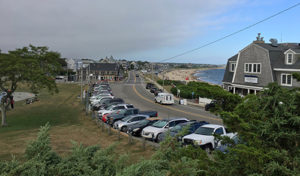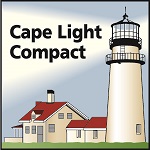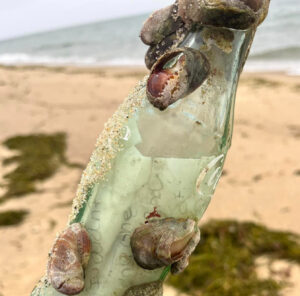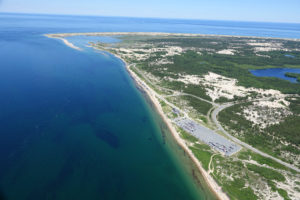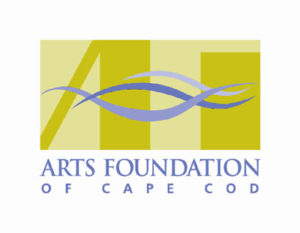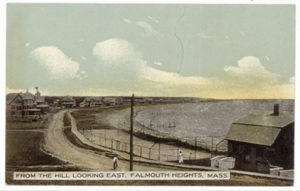
A view of Grand Avenue in Falmouth Heights from a century ago. Courtesy of Falmouth Library, Robert C. Hunt Collection
The ‘tea room’ was a small restaurant or café which would serve tea, other light refreshments, and some food. They still exist today on Cape Cod in places like the Dunbar Tea Room in Sandwich. However their heyday was in the pre-World War II era where dozens of such establishments dotted the Cape landscape. They were seen as a quiet place to meet and enjoy refreshments and good company. They were seen as ordinary and commonplace. That being said, one particular tea room took an interesting turn from casual meeting place to troublesome nightclub in a time when such places were extremely rare. This is the story of The Hangar Tea Room in Falmouth.
The history of The Hangar began during the Roaring Twenties, a time of great prosperity, freedom and excess, though also a time during Prohibition when alcohol sales were illegal. This tea room was initially known as the Grey Gull and from the start it had a different flavor with the Falmouth Heights establishment offering music and dancing in addition to the normal fare of a tea room. At its opening in 1923, under the management of Walter Knox and Paul Lehmann, the Grey Gull was a viable nightlife option at a time when such options were few and far between. Still the allure of dancing, tango lessons, and a unique gift shop were not enough and the tea room was sold in 1924 to Mary Fellows. She would keep supplying music and dancing as well as good food to try to build on the foundation of the previous ownership.
Fellows would run the seasonal establishment on Grand Avenue from 1924-1928 before deciding to move on. She would retain ownership of the property but decided to lease the building in May 1929 to Robert Butler who would change the Grey Gull to The Hangar. Butler would go all-in even using a life-sized airplane fuselage as a sign in the front of the building. It would be for naught as in less than a year The Hangar would have a new manager and its most infamous chapter would begin.
In February 1930 William Wagner would take over The Hangar, he had been a part of the tea room’s orchestra the previous year. Soon after the new owner took over there would be hearings in the town about questionable conduct occurring at The Hangar under the reign of Robert Butler. People complained about late hours, congested traffic, lewd behavior, and possible intoxication during the Prohibition era. Wagner insisted those questionable acts did not occur under his watch and he was able to begin his tenure as manager. The town agreed and the new Hangar pushed forward.
During the spring many renovations were done on the property. The interior of the building was redecorated in orange and black with the dance floor being enlarged. Mini planes and zeppelins were in place to spell out the name while the kitchen got a major overhaul as well. Everything was in place for the grand reopening June 26, 1930. The summer was a huge success for the tea room which acted as a nightclub. Wagner would close in for the season in October and begin plans for more remodeling. The Hangar would have its interior enlarged again before the 1931 season began in June.
The mood at The Hangar changed shortly thereafter. In July a ‘pajama contest,’ a tamer version of the modern bikini contest, was held at the Falmouth Airport, with the winner of the contest being named ‘Miss Pajama.’ The after party, complete with the presentation of a silver loving cup, would be held at The Hangar. Marie Davies of Reading, Massachusetts would be named the winner out of more than forty entrants and tea was served by Wagner for the party goers. The following year on Labor Day 1932 the Pied Piper’s Orchestra would walk out on the festivities at The Hangar over a pay dispute with Wagner which they eventually won. However nothing would compare to what happened in November 1933.
On November 4, 1933, despite being a seasonal establishment, a wild party was raided by Falmouth Police at The Hangar. It was during this raid that throngs of intoxicated patrons were discovered along with moonshine, gin, and whiskey among other liquors. Prohibition was still in effect until the end of the year, despite many states having ratified the repeal already, making the sale of alcohol still illegal. William Wagner was arrested for the infraction. Complaints about intoxicated people wandering around in the vicinity of The Hangar had been made previously and when many cars were spotted there on the cold November night police gained a search warrant and found the crowd huddled in a small room warmed with an oil heater. Wagner had been warned by the police before and they were not so lenient.
Though the fine was small, only $50, the damage to Wagner was much larger. He would go back to conducting orchestras. In 1934 The Hangar would attempt to reopen as a plain old restaurant called Wagner’s at the Hangar run by William’s wife Dorothy. It would legally gain a liquor license after the repeal of Prohibition on December 5, 1933. William would eventually receive six months probation for his infraction.
In August 1934 The Hangar would temporarily lose its liquor license for selling alcohol after hours. The liquor license renewal for 1935 would be refused. Despite producing a petition and repeatedly attempting to procure a new liquor license 1935 would prove to be the final year for The Hangar. It would be run by the Wagners as the Harbor Lobster Pound before Bass River Savings Bank would purchase the failing business for $1,000 ($18,000 in 2018) in March 1936.
William Wagner would continue a successful career as an orchestra conductor but his failings with getting a new liquor license would consume him. He would unsuccessfully run for Town Selectman eleven times beginning in 1938. In the years following the demise of The Hangar Falmouth Heights would see several beloved drinking establishments come and go including the legendary Casino and Brothers 4. However it is hard to speak of those spots without giving a shout out to the originator, a tea room that served much more than tea.
By Christopher Setterlund




